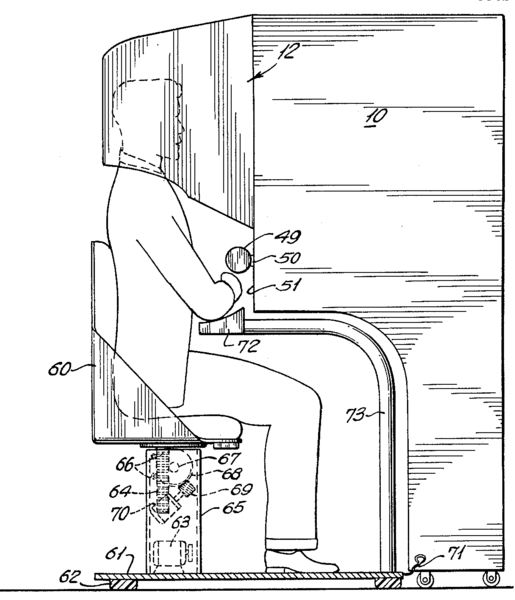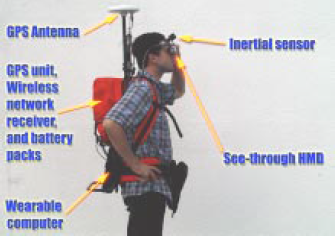Most of you might have come across the phrase “Augmented Reality” but there still is some confusion in differentiating between augmented and virtual reality. So what is it? Augmented reality, as the name implies, is an augmentation of real world, while virtual reality replaces real environment by computer generated graphics. So the user using a VR device sees nothing but CGI and in AR it’s all about embedding some elements in a regular field of vision.
At the turn of the 50s and 60s, Morton Heilig, a camera operator and a pioneer in VR, invented a machine called Sensorama. It was used to display 3d videos and additionally it released various scents.

Another milestone in both virtual and augmented reality was creating the first Head Mounted Display (HMD) by Ivan Sutherland. That was a direct path for displays we know today - like Google Glass or Oculus Rift.
In the 80s Steve Mann developed first wearable devices, also first augmented reality glasses. We can thank the same man for smartwatches as well.
The real boom began in the 90s when Augmented Reality found its use for military purposes. In 1992 Boeing’s researcher, Louis Rosenberg, prepared a system called Virtual Fixtures for the United States Air Force. It was used for enhancing efficiency of remote operations. After that, in 1999, Naval Research Laboratory, began working on another system - BARS (Battlefield Augmented Reality System). Keeping in mind that military operations in future could take place in urban locations, they came to realise such places bring a lot of difficulties, like limited visibility, ineffective communication, sniper threats, being unable to differentiate between enemies and allies. Radio communication and using paper maps are unhandy to say the least. That’s where augmented reality helps. BARS came with a portable computer, a wireless network receiver and an HMD, allowing all the necessary actions without ever looking away from the battlefield by displaying data on HMD.

From then on the path was clear for AR in everyday life. In the year 2000 Bruce H. Thomas remakes a famous game, Quake, and makes it augmented. That means theoretically you can just equip an HMD and shoot computer generated enemies outside. Although it is said by the author that it would be very expensive (thousands of dollars).
But not everything is lost for a casual user. In 2008 we were presented with first Android smartphones and first Android apps working in augmented reality. Since then there have been many applications using AR, but most of them are meant to enhance sightseeing experience, either outside, showing where you can eat fancy food or do some fun activities, or inside, like museums, where you can get additional information about exhibitions.
The most awaited moment came in 2012 when Google announced Google Glass and started beta tests in 2013. Everyone is more or less familiar with the gadget. It includes a camera, display, microphone and gains wireless Internet connection via smartphone. Not much different from regular glasses, Google Glass provides users with graphical and textual information right before their eyes.

Nowadays a lot of hope is put in using augmented reality and mobile and portable devices to enhance the learning process. There are developed apps teaching children simple maths, colours and general basic knowledge. Personally I hope more effort will be put in developing educational applications for older audience because natural science offers so many opportunities to put AR to good use and make studying easier and more fun.
What are your thoughts? Are there any AR apps that you like? Or maybe you’d like something to be developed in near future?
The idea was first mentioned by Frank L. Baum, the author of “The wonderful wizard of Oz”, in his story “The Master Key”. Baum writes about a device called the character maker, special glasses, allowing people to see a note on the forehead of the person they looked at. That note mentioned something related to the target’s character. That does sound a lot like Google Glass, but for many years that remained just a dream.
At the turn of the 50s and 60s, Morton Heilig, a camera operator and a pioneer in VR, invented a machine called Sensorama. It was used to display 3d videos and additionally it released various scents.
Source: U.S. Patent #3050870
In the 80s Steve Mann developed first wearable devices, also first augmented reality glasses. We can thank the same man for smartwatches as well.
The real boom began in the 90s when Augmented Reality found its use for military purposes. In 1992 Boeing’s researcher, Louis Rosenberg, prepared a system called Virtual Fixtures for the United States Air Force. It was used for enhancing efficiency of remote operations. After that, in 1999, Naval Research Laboratory, began working on another system - BARS (Battlefield Augmented Reality System). Keeping in mind that military operations in future could take place in urban locations, they came to realise such places bring a lot of difficulties, like limited visibility, ineffective communication, sniper threats, being unable to differentiate between enemies and allies. Radio communication and using paper maps are unhandy to say the least. That’s where augmented reality helps. BARS came with a portable computer, a wireless network receiver and an HMD, allowing all the necessary actions without ever looking away from the battlefield by displaying data on HMD.
Source: BARS: Battlefield Augmented Reality System
Istanbul, 2000
But not everything is lost for a casual user. In 2008 we were presented with first Android smartphones and first Android apps working in augmented reality. Since then there have been many applications using AR, but most of them are meant to enhance sightseeing experience, either outside, showing where you can eat fancy food or do some fun activities, or inside, like museums, where you can get additional information about exhibitions.
The most awaited moment came in 2012 when Google announced Google Glass and started beta tests in 2013. Everyone is more or less familiar with the gadget. It includes a camera, display, microphone and gains wireless Internet connection via smartphone. Not much different from regular glasses, Google Glass provides users with graphical and textual information right before their eyes.
What are your thoughts? Are there any AR apps that you like? Or maybe you’d like something to be developed in near future?
Comments
But it looks like we still have to wait for some time before we receive both hardware that is actually well-designed, and software that would make such glasses useful. Because some time ago, like 1 or 2 years ago, I had the pleasantry of testing google glasses with custom software. And at that point I felt like having overpriced glasses for watching static instructions (application was a cooking book, something like that) is kind of barren. I know it was simple software for device that was unreleased but I feel that without decent software, AR glasses are not going far. And if the device costs something like 1000 USD I am not sure how they are going to get by with solution: "maybe sometime, someone will make a good piece of software for that device". But as tech enthusiast I have a lot of hope.
However only a little bit of topic I would like to mention Virtual Reality (I didn't know a new article would suddenly appear in the middle of the week about it but I still wanted to post it here). I recently had a chance to try the new version of Oculus and also HTC Vive. I think it's the new step in the entertainment industry and after I tried a couple of games I think it's an indescribable devise and the experience is really amazing and immersive. Check it out
Oh yeah, neither did I know that an article about Virtual Reality will be posted, what a coincidence :) VR googles sound like a great opportunity for entertainment industry, I hope to have a go some day.
One of examples of such advertising could be the promotion of Star Wars movie, which displayed the 360 degrees video on Facebook:
https://www.youtube.com/watch?v=JU3t0H3N8Kc
Another example could be outdoor advertising such as this done by Pepsi, I really recommend you to watch it: https://www.youtube.com/watch?v=Go9rf9GmYpM
https://www.youtube.com/watch?v=Go9rf9GmYpM
https://www.youtube.com/watch?v=Qm2gnnyyvEg
I have to admit that if AR will become as powerful as Microsoft tries to tell us it is, the boom for personal computers will be small thing compared to AR. Hovewer I think that we still have few years before AR devices will be that good. For me it is interesting invention, but still there are many things to solve, like battery lifespan, or programming for such devices, it surely is not as easy as making website.
I heard something about Vuforia Augmented Reality SDK project https://www.youtube.com/watch?v=Ct0r44ZPH-k :)
I agree, with Michał, i think where AR shines is the ad market. Like this ad in playboy for Audi (https://www.youtube.com/watch?v=FZ8qIfxugeY) yeah it looks cool, but it really doesnt do much :P
Other than that maybe interior design, that would allow users to see how their home/office will look like without spending huge amount of money on furniture. It allows users and designers to present their work and get good feedback on it.
I would like to see something along medical scanners that would show doctors where the problem is, its kind of far fetched idea but thats what i'd like to see in future.
Obviously AR has already found its broad use in many industries, which is good, but it still needs improvement in many ways.
i can't really remember the App name but i do remember that our Teacher said that this technology has been bought by apple, so you can use this app till the end of the year and after it will not works. so i am expecting apple to come up with something great in use if AR by 2020.
In my opinion, AR is really nice, BUT - as Natalia already said - it's a pity that you need additional stuff (like apps) to get it working. However, I'm surely going to watch that area of art closely, because I'm sure it's apt to change in the future :)
I didn't know Frank L. Baum first mentioned a similar device in his stories; that's really interesting! Many inventions came to life because of artists & writers, like helicopters (Leonardo da Vinci) or mobile phones (inspired by Star Trek). It's a generalisation of course, but their creative and unconventional thinking lets them imagine stuff that more 'regular' people wouldn't think of. Then scientists help bring the ideas to life. It's really beautiful what human imagination can come up with.
I've found this article about inventions inspired by science-fiction: [LINK]; it's really interesting.
https://www.youtube.com/watch?v=2sj2iQyBTQs
Virtual Reality Booth
movie direction course in india
movie director course in india
top filmmaking colleges in india
cinematography institute in india
best filmmaking colleges in india
best cinematography institute in india
top 10 film institutes in india
top 10 film making institute in india
top filmmaking institutes in india